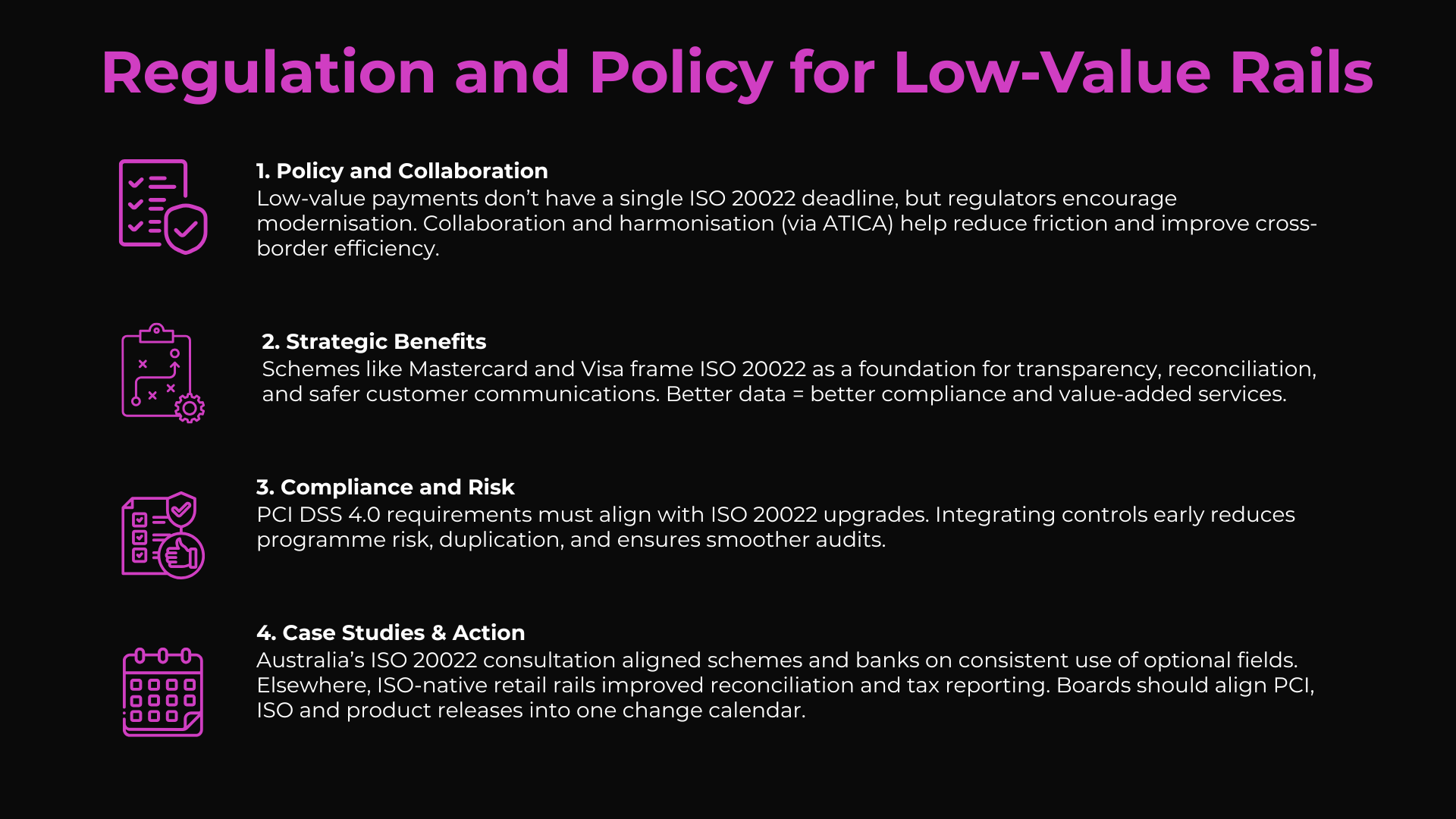Policy and Collaboration: How Low-Value Rails Modernise
Low-value payments typically do not have a single regulatory deadline for ISO 20022. That does not mean there is no regulatory story. In many markets, public authorities encourage industry to modernise collaboratively rather than through mandates. The cards community has responded by progressing ATICA within ISO’s governance and by advocating for harmonised implementations at the country level. The result is a policy environment that rewards leadership and coordination.
Consider Europe’s experience. The Eurosystem has long argued that the cards market should pursue a more ambitious approach to interoperability so that European cards remain competitive and efficient. This is not a narrow directive to switch formats. It is a strategic signal to align data and processes so that merchants, acquirers and issuers can operate with less friction across borders. ISO 20022 provides that common language when used consistently.
Schemes are also tying ISO 20022 to broader retail priorities. Mastercard’s research on real time payments frames ISO 20022 as a core building block for transparency and value added services. Visa’s policy work encourages markets to adopt the latest version of ISO 20022 and to harmonise optional fields so that the benefits are portable. The consistent theme is that better data enables better safety, faster reconciliation and clearer customer communications. None of that requires a wholesale mandate to start.
Strategic Benefits and Case Studies in Policy-Aligned Execution
What about compliance domains that touch cards regardless of message standards. PCI DSS version 4.0 brings an extensive set of technical and operational requirements with compliance milestones that run into 2025. Operators that plan ISO 20022 upgrades in authorisation or reporting should align their roadmaps so that encryption, key management, logging and access controls satisfy PCI at the same time. This reduces programme risk and avoids duplicate testing.
The practical consequences of delay in low-value differ from wholesale systems. You will not be switched off a central RTGS. The risk is competitive rather than existential. Merchants will prefer acquirers that offer richer data for reconciliation. Issuers will prefer networks that reduce fraud friction. Fintech partners will integrate faster with providers whose APIs expose structured context. Over time, the providers who treat ISO 20022 as a strategic enabler will grow share at the expense of those who treat it as someone else’s problem.
Boards should ask three questions. First, do we have a clear position on where and when to adopt ATICA within our card flows. Second, have we agreed a national or network stance on harmonising optional fields so that our partners do not need custom mappings per counterparty. Third, are we aligning PCI DSS 4.0 controls with our ISO 20022 programme so that we pass both audits with one set of artefacts. The answers determine whether ISO 20022 feels like a burden or becomes a platform for growth.

Two case studies illustrate policy aligned execution. In Australia, industry consultation on ISO 20022 migration created a forum where schemes and banks could align on the latest version and the consistent use of optional fields. That work reduced the risk of divergence before vendors locked designs. In several markets where real time retail rails were launched natively with ISO 20022, regulators saw downstream benefits in tax reconciliation and public sector payments because structured data made matching reliable. These are practical public value outcomes that begin with a better message standard.
Digital Bank Expert’s advice is to treat policy as a tailwind. Use ISO governance artefacts, scheme guidance and national consultations to align stakeholders early. Document your harmonisation choices and publish them to partners. Build a change calendar that layers PCI, ISO and product releases to lower fatigue. When regulation leaves room for leadership, take it.
Related Articles
- The Low-Value Playbook: Migrate Without Losing a Millisecond
- ISO 20022 For Low-Value Payments: Data That Scales With Your Volume
Bibliography:
-
- ISO 20022. “Business Justification and status pages for ATICA submissions.” 2020 onward. ISO20022+2ISO20022+2
-
- ECB. “Cards in Europe. Current landscape and future prospects.” 2019. European Central Bank
-
- Visa submission to the Reserve Bank of Australia. “ISO 20022 Migration for the Australian Payments System.” 2019. Reserve Bank of Australia
-
- Mastercard. “What is next for real time payments.” 2024. Mastercard
-
- Federal Reserve Bank of Atlanta blog. “A look at PCI compliance and new data security standards.” 2024. Federal Reserve Bank of Atlanta
-
- PCI Security Standards Council. “PCI SSC official site.” Accessed 2025. PCI Security Standards Council

